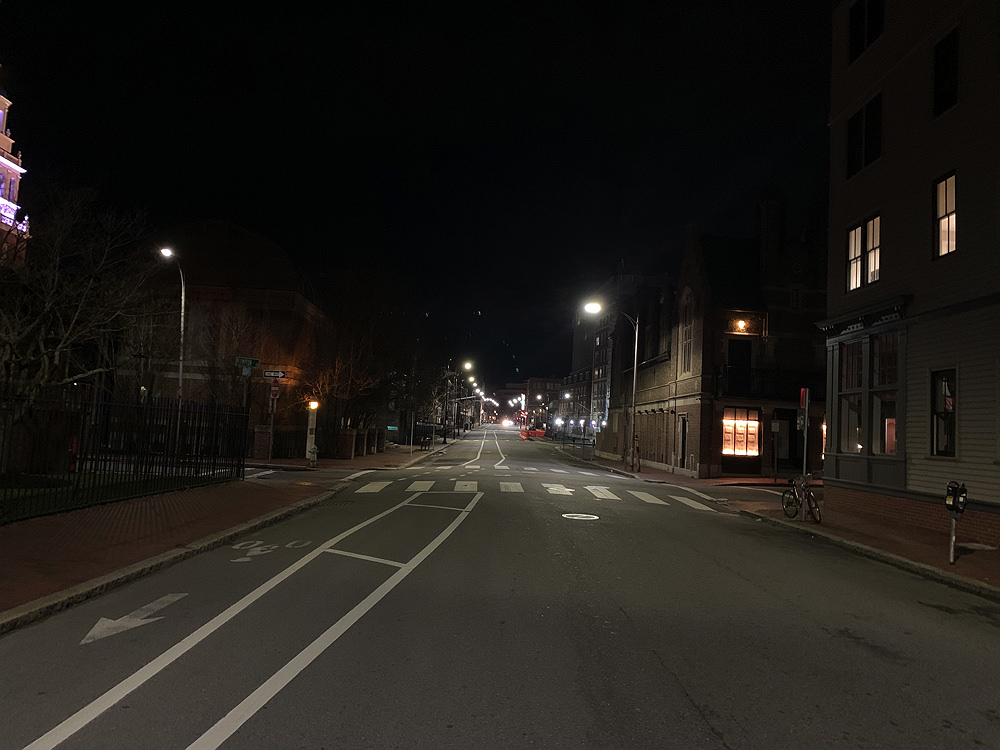One month ago, on a miraculously warm day, I turned in my history and literature thesis and celebrated with friends. Now, I sit alone in a vacant dorm on a deserted campus waiting for the hours to pass.
On March 10, in response to the COVID-19 pandemic, Harvard delivered its undergraduates a five-day eviction notice. In the following days, nearly every college across America followed suit, sending millions of students scrambling to pack their belongings, finish midterms, and flee campuses. But not everyone has left their respective colleges: many schools have extended exceptions to a tiny subset of students who cannot go home.
Students remaining on campus often face dire circumstances. One of my classmates is homeless after her parents passed away. Another is undergoing intensive chemotherapy in Boston and cannot leave quarantine. Another comes from a country without stable Wi-Fi to stream live lectures. Others face abusive households; still others cannot afford flights home.*
For the several hundred of us still here, living on a ghost-town campus has proven disquieting—and profoundly isolating. Virtually overnight, our classmates evacuated. On-campus libraries, gyms, and common spaces closed. Hand-sanitizer dispensers replaced colorful school flyers; empty courtyards replaced the crowds of tourists. Restaurants in the normally vibrant Harvard Square shut down.
Most days, I see no one at all. Despite a lively on-campus group chat titled “Fallout Shelter Kids,” hanging out is hard to come by. Almost every building and room on campus is locked. The few of us remaining on campus have been relocated to new housing further apart from each other to prevent the potential spread of the viral disease.

For students on campus, even eating has become an antisocial activity. Twice a day, I leave my room to pick up food. The dining hall is boarded up: tables, chairs, couches—even ping-pong tables and sitting booths—are turned upside down, covered in yellow caution tape. On the off chance that more than one student picks up lunch at the same time, we wait six feet apart from one another. Sometimes I eat with a fellow undergraduate at a socially responsible distance by the Charles (though no more than one, as Harvard restricts social gatherings to two individuals maximum). More often, I return to my assigned room, where I watch Netflix and eat at my desk.
For many, the isolation of an empty campus has begun to feel unbearable. Of the few friends I do have on campus, many are considering moving, or have already moved, off-campus. A classmate on my floor left to live with a classmate whose family was in the area. Another moved in with a classmate’s sister who lives in Boston. Still others are still figuring out whether, or how, to leave a suddenly unfamiliar campus.
As a student, Harvard has been the primary actor dictating what my current life looks like—much more strongly and directly than any mayor or governor. Throughout this process, I’ve been struck by the way universities have made decisions in the absence of governmental protocols. It is colleges that decided, far before any states of emergency were declared, to evacuate students. And now, with government bureaucracies strained and spread thin, it is also colleges who must determine how to care for their most vulnerable populations. Graduate schools are faced with important decisions too: medical schools across the country are debating expedited graduation so their students can join the front lines of an increasingly severe pandemic. Given the novelty of the sudden crisis—combined with the ineffectiveness of the American government—it is increasingly individual institutions, such as universities, that find themselves tasked with responding to a global emergency.
But a university cannot mitigate all the changes brought by coronavirus for students. For some, the ramifications of COVID-19 cannot be remedied by a virtual Commencement or online classes: the vast majority of on-campus jobs, a primary source of income for students on financial aid, were canceled. The few still on campus don’t have families to go back to. Even those who have escaped campus face the glaring teeth of a new reality: several of my friends are worried about their futures, and how to pay for college, now that their parents have been laid off. Many do not have access to high-speed Wi-Fi or ideal work-from-home environments.
College, it seems, is more than an education: it promises some semblance of a home, of equity. Only a month ago, college students sat in the same classes, ate lunches together, studied in the same libraries. Now, scattered across the globe, some are confined to empty dorm rooms, and some struggle to provide income for their families, while others quarantine in summer houses. These different realities had always existed, but now, with the sudden departure of campus life, the disparities in our lives are impossible to ignore.
This new reality is not exactly how I imagined my college experience ending—alone, with Commencement replaced by solitude and quarantine. I’m lucky to be safe and healthy, with access to the University Health Services. And I am grateful to the Harvard dining-hall and building staff who continue to provide for us. Still, for the few of us who remain stranded on campus, it’s a melancholy spring.
*The Faculty of Arts and Sciences Communications Office states: All students receiving financial aid were eligible for reimbursement of their travel costs. Students with a $0 parent contribution will be fully reimbursed and all other students on financial aid will be reimbursed up to $750 depending on their level of aid. Exceptions beyond $750 will be granted for aided students on a case-by-case basis. Students used the COVID-19 Emergency Travel Reimbursement Form to request a reimbursement for all costs within reason for various modes of transportation associated with departing campus. Students who are not receiving financial aid from Harvard were not eligible for reimbursement via the Financial Aid Office.









